"One must know who the audience is and, when dealing in millions, this is no easy thing." |
Sydney Newman, 1959. |
What's the first thing you think of when you hear the words 'Armchair Theatre?' It might be an actor or a writer, perhaps even the title of a play or the memories you associate with it – fond or otherwise, but it's more likely to be one important and often elusive trait: quality. This immediate, often knee-jerk association is particularly apt, since that's exactly what ITV were striving for when working to bring the series off the drawing board and into the homes of mid-1950s Britain.
Already gaining a larger audience share than BBC for it's popular Saturday programming, such as Sunday Night at the London Palladium, ITV set out to prove the commentators who believed commercial television would bring down the tone and standard of the television as a whole (some would argue that pronouncement is a prophetic one) wrong by commissioning a prestige drama series to parallel those of their Public Service Broadcasting rivals. Even in these early years, this route was a tried and tested one, and ITV had made early attempts to reach that loftier ambition in the form of Theatre Royal (1955-1956) and TV Playhouse (1955-63). While these series were successful – especially in the case of the latter, thanks to the combined skill of writers Dennis Potter and Alan Sharp, the first anthology drama series to make its mark on television history was in fact Armchair Theatre.
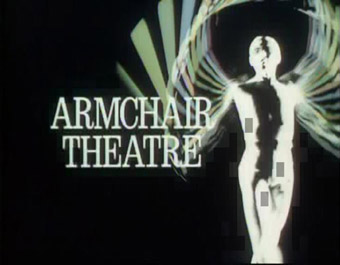
What would ultimately become a landmark in British television and the jewel in ITV's crown thanks to its innovations in production and style had a rather more conventional beginning. Conceived by Howard Thomas (a former producer for the BBC) the series was launched by ABC television in 1956, with Dennis Vance's 'The Outsider.' Vance previously worked on both Theatre Royal and TV Playhouse, and remained working on the programme for two years, taking up the position of producer. Sadly, much of the plays from Vance's time on the series have been lost, but were predominantly adaptations of high-brow literature and theatrical sources ranging from Ibsen to Strindberg alongside original work from emergent British writing talent.
This new era for the series was ushered in by Ted Willis' (creator of Dixon of Dock Green amongst seminal projects) groundbreaking interracial romance 'Hot Summer Night,' in 1959, appropriately coinciding with a similar new wave for British cinema, also defined by it's social realist roots. Though Newman and his team attracted young directorial and writing talent, including Ted Kotcheff, Philip Saville, Charles Jarrott, Alun Owen, Ray Rigby, Clive Exton and Angus Wilson, often in their first work for television, the inherent risk in taking them on was greatly reduced by the privileged position Armchair Theatre occupied in the schedule, following the aforementioned Sunday Night at the London Palladium, giving an outlet to writers which would otherwise have no way of reaching an audience of any kind. A notable case-in-point is Harold Pinter, whose stage work had somewhat alienated critics. The airing of his first work for television, 'A Night Out' would not only connect with audiences, but manage the unprecedented feat of being the top rated programme in the TAM ratings for the entire week.
When it fully embraced this home-grown strand of its output became its hallmark, Armchair Theatre came into its own during 1958, and under Canadian producer Sidney Newman (poached from CBC to head the ABC's drama department) as it began to cater less for the upper classes and more for the man in the street, fitting with Newman's admiration for socially relevant, realistic drama, which would play an influential role on the look, feel and content of the anthology the years to come. In fact, this aesthetic became so typical; it led to series being given the rather unfortunate moniker of 'Armpit Theatre' by critics. Though it may have been an amusing joke, it's also a misconception; since Newman ensured that the production's remained diverse in both genre and style, spawning the first of the programme's spin-offs with Out of This World (1962) and Armchair Mystery Theatre (1960; 1964-65). Ever attuned to the changing needs of his audience, Newman announced that there would be "no more plays about 'kitchen sinks', unless they are brilliant," and continued to provide a diverse output of plays (including those with social realist roots) until his departure for the BBC in 1963.
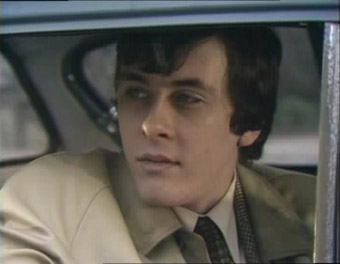
Ironically, Newman's successor Leonard White, (formerly producer of both Out of This World and Armchair Mystery Theatre, as well as the early episodes of The Avengers (1961-69), would be somewhat eclipsed by his predecessor, both in terms of legacy, and his continued work at the BBC, primarily in the form of The Wednesday Play (1964-70), which would ultimately take Armchair Theatre's place as an example of cutting-edge drama. However, the series still produced important and influential plays such as David Mercer's 'A Way of Living,' Donald Churchill's 'The Hothouse,' whilst continuing to attract high-calibre writing, directorial and acting talent, providing the springboard for spy drama Callan.
In its latter years, helmed by Lloyd Shirley, now produced by Thames, the series would struggle against criticism that the television play was a dying form. At that time, Armchair Theatre's very name – which was once lauded as the gold standard, to which all other dramas should aspire – was now an outdated reminder of theatrical roots that television had seemingly outgrown. The series' eighteen years on the air came to an end in 1974, and was revived in the form of various spin-offs in the form of Armchair Cinema (which aired Ian Kennedy Martin's 'Regan' the forerunner to landmark drama The Sweeney in its first series) and Armchair Thriller (first used in 1967) for an anthology suspense dramas (1978-80).
The passage of time has allowed Armchair Theatre's value to our television, social and cultural history to appreciate, and as its modern predecessors prove, is more than by no means a dying breed and is more than equal to its theatrical equivalent. However, without the work of all those involved with the creation of Armchair Theatre programmes such as BBC's Afternoon Play would not have been possible, and as such remains a shining example of the unique position the single drama occupies in those historical contexts. Allowed the most intimate from of exhibition – our home – it is both a part and a reflection of our constantly evolving nation and all the people in it. Though its fortunes may have changed over the years, the quality and importance of this seminal anthology is undeniable.
Following on from Network's superb classic television release of The Prisoner, this first volume of plays concentrates on Armchair Theatre's later years, and is as much about archiving the material as it is presenting it for the purposes of entertainment. In spite of the sheer vastness of the anthology's output, much of it is lost. As previously mentioned, much of the formative years of the anthology's vast output have been lost, and recording of the plays wasn't instituted until 1958, in the aftermath of the sudden death of actor Gareth Jones, partway through his performance in James Forsyth's 'Underground.' From this standpoint alone, Network should be commended, since this set makes a valuable and important contribution toward keeping our rich and diverse television alive and, perhaps most importantly of all, accessible, whether you want to view it for the purposes of nostalgia or for academic study.
The set contains eight plays first broadcast between 1970 and 1973, shown here in their entirety and without having to suffer the ad breaks (however, the intertiles denoting the start and end of each act remain). Each one can be selected and viewed on its own or alternatively, you can use the 'play all' feature to watch them consecutively in the order they appear below.
Disc One
Say Goodnight to Your Grandma [1970] (53:07)
Written by and starring Collin Welland, this BAFTA award winning drama was the main draw for me in regards to this set, and it's no stretch to say that it's worth the purchase price on it's own.
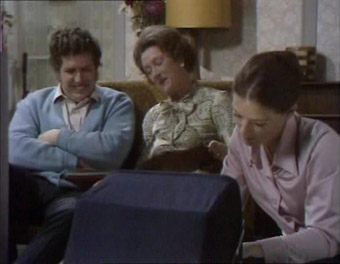
Returning home with his wife Jean (Susan Jameson) and baby daughter Cressida, Tony (Welland) is a man caught between the proverbial rock and hard place, contending with the demands of his wife, mother and proud new grandma 'Nana' (Madge Ryan) as well as mother-in-law Mrs 'Grannie' Clark (Mona Bruce), during a 'meeting of the matriarchs.' As the women try to stake their claim, tensions escalate, causing Tony to retreat to his past, bringing his childhood friends Harry (Ralph Watson), Ken (Ron Davies), Eric (Colin Edwynn), Phil (Duggie Brown) and Ray (Jack Smethurst) home for an impromptu celebration, much to delight of Nana and the dismay of Jean, until she decides to teach them all a lesson they're unlikely to forget.
At its heart, Grandma is about the struggle to balance the 'new' and 'old' parts of ourselves, our lives, and all the people in it, this is a wonderfully written piece with a light comedic touch to balance out the more emotionally-charged moments, delivered by a strong cast. It's easy to see why it garnered attention from BAFTA. The play's opening moments, which explain Tony's travel plans in the form of letters between Tony and Nana (shown superimposed on top of family photographs and read in voice over by Welland and Ryan), are a particularly nice touch. Clearly influenced by social realist drama and the much-loved television staple of the soap opera (or serial drama for the purists), like many of the other plays in Armchair Theatre's output, Grandma has a warmth and a familiarity about it, if you don't know people like Tony and his family, you probably are like them. Immensely enjoyable.
Office Party [1971] (50:31)
At a very different stage in his life to Grandma's Tony, soon-to-retire bank manager Mr Moore (George A. Cooper) works through his last day while his colleagues organise a farewell party in his honour. Written by Fay Weldon (under the pseudonym Laurence Wells), I don't think it's a coincidence that his character is presented as something of a dying breed, exemplary of the British stiff-upper lip, he's a full of pride and a stickler for rules, but all too aware the world around him is changing, and his time is running out, and those around him are in search of 'new blood.' It gives everything here a bittersweet, almost foreboding feel, which is entirely outside of the concept of taking retirement.
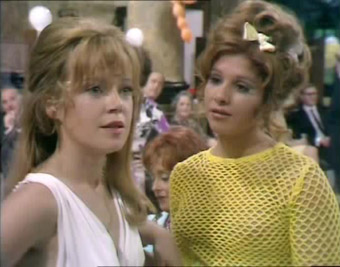
The underlying theme of uncertain futures, further reflected in the storylines of the other bank employees including incoming manager Dickie (Peter Barkworth), young expectant mum Julia (Angharad Rees), her boyfriend Paul (Ray Brooks) and their customers seem particularly poignant in our current economic climate. This is proof, if any were required, that while some TV drama can all too easily show it's age – though it's not to say that this isn't also an artefact of life in Brittan circa 1971 – and look outdated, others can really transcend the time period they were made in and remain relevant to a modern audience Suffice to say, I think that Office Party very much falls into the latter category. An interesting if not wholly satisfying experience.
Brown Skin Gal, Stay Home and Mind Bay-Bee [1971] (52:57)
Written by Robert Hollies, this is an interesting look at what happens behind closed doors, proving in no uncertain terms that appearances can be deceptive. Well-to-do suburbanites Ruth (Billie Whitelaw, in one of her nine appearances in the Armchair Theatre anthology) and her two friends Olga (Anna Cropper) and Joanna (Ann Firbank) like to gossip, and love a scandal. At first sight, they're the epitome of ladies who lunch – or in this case, take tea – who thrive on dissecting the social lives of their friends and neighbours and bemoaning the tribulations of day-to-day life. Ruth meanwhile, has more to contend with, recently divorced, and with a young daughter, she's struggling to adjust to life without her husband. When she lets the basement floor of her house to Roger (Donal McCann) to gain some extra income, the two grow closer, but are bound to the point of suffocation by social mores, and the scrutiny of their friends. Whilst Ruth is very much alone, Roger takes his lecherous workmate Arthur (Mark Kingston) into his confidence, who immediately encourages him to peruse Ruth regardless.
Though this first appears to be something light and frothy – a very British, very 1970s version of Sex and the City, if you will – there's much more here than meets the eye. Ruth's thinly-veiled loneliness gives everything a tragic tinge, even in its lighter moments. The scenes with her and Roger are particularly fraught, though they come from completely different worlds, their connection is equally obvious, and what remains unsaid between them is just as important as what is – helped along by the strength of the performances, and the chemistry between, Whitelaw and McCann, which has just the right amount of uneasiness.
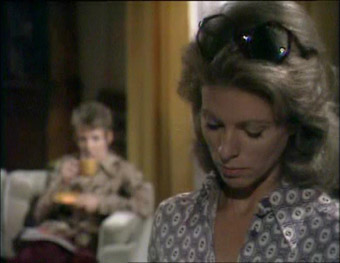
All good writing stems from observation, and Hollies' script delivers in spades, bringing a surprising amount of depth to the proceedings, which is fitting, since this is as much a play about the artifice of social behaviour and the disparity between the person we present to the world and the person we really are, as it is about suburban life, and the class system. Definitely one of the best in this set.
Detective Waiting [1971] (52:59)
Rookie Detective Constable John Lewis (Richard Beckinsale), is sent on a stake out to observe underground crime boss James Cummins (Barry Lineham), and he's determined to convict him at whatever cost. This is a classic cat and mouse tale, and Cummins always seems to have the upper hand, thanks to his high-powered circle of friends. He's the classic rich-living criminal, whereas Lewis is painted as a rather lowly adversary. Labelled by his superior Arthur (Barry Pringle) as argumentative, stubborn and solitary, Lewis is the antithesis of the teamwork-oriented, teambuilding-obsessed ethos of modern policing. This is a man who works hard to get things done, unconcerned by social pleasantries, his job is what matters the most, and it's anything but glamorous, with a lot of his time spent, as the title suggests, just waiting to corner his nemesis, parked outside in his car.
Written by Ian Kennedy Martin, famed for his detective and police dramas such as The Sweeney and Juliet Bravo, Detective Waiting prefigures them both, but it's easy to find early indicators of his distinctive writing style, particularly in the pace of the narrative, especially when compared to the other plays on the first disc. Perhaps due to its setting this feels more like a pilot than a play, but this is so well-conceived it's difficult to imagine a character like Lewis in a long-running format and Beckinsale is wonderful to watch as he runs the emotional gamut throughout the story. This is an intriguing piece, which will certainly please any fans of Kennedy Martin's many works.
Disc Two:
Will Amelia Quint Continue Writing 'A Gnome Called Shorthouse'? [1971](53:23)
The bosses of Denham Publishing Company, Lewis (Richard Vernon) and Miles (Geoffrey Chater), are keen to lure their client, the mysterious Enid Blyton-esque Amelia Quint (a particularly wonderful, Beryl Reid), a successful children's novelist, away from her life in Italy, and back into writing after a long absence. Thinking they have a sure-fire bestseller if she were to work again, Miles sets off to try and persuade her to set pen to paper again. Unfortunately for him, the eccentric Ms Quint is clearly having far too much fun and looks in no mood to trade Italy for England, too busy speeding round her coastal village home on a scooter with not a care in the world, entertained at home by toy-boy gardener Nico (David Warbeck) and chef Guilio (Norman Rossington). As a result, Miles is left with a lengthy list of demands to Lewis back at the publishers' office in order to secure Amelia's continued relationship with the firm, and learns in no uncertain terms that you shouldn't judge a book by its cover.
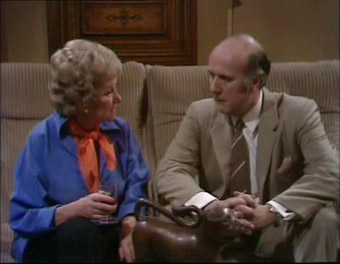
There's a lovely aesthetic contrast between the grey-hued, cold, positively dull publisher's office and the sunny, lush, picturesque vistas in Italy, that make you want to get up and follow her there – which is undoubtedly the point. Of course, it's not entirely coincidental, since, at the time, air travel was booming, and there's an obvious aspirational appeal of living a life like Amelia's which has lost none of it's glamour in the intervening years (especially when you're watching on a cold, snowy January day!)
For a series renowned for its roots in social realism and social commentary, with it's audience height reached during the 'kitchen sink' drama era, this is something of a change in look and style, but it's a refreshing one, heralded in by producer Sydney Newman, who wanted to leave those associations behind. While it's primarily a light-hearted piece, with some particularly snappy one-liners, it doesn't disregard these roots entirely, since writer Roy Clarke has made painted a very British picture of living aboard – stereotypes and all. In many ways, the marvellous Ms Quint is aptly named, since it's impossible to imagine her being from any other country but ours. Though she may be the embodiment of eccentrics everywhere, she's definitely quintessentially British. A great deal of fun.
The Folk Singer [1972] (51:20)
This year saw the Armchair get reupholstered in the form of a new title sequence, trading in the multicoloured flashing words for an equally rainbow-decked dancer, and rather classy looking font.
Much like the bizarrely titled Amelia Quint, The Folk Singer came as something of a surprise. Firstly, it flags up just how different the output of Armchair Theatre could be in terms of tone whilst still retaining an important outlet for social commentary. Indeed, in its formative years, it was known for its chameleon-like nature. Secondly, it emphasizes that these plays aren't as throwaway and as the lighter constituents of the anthology would have you believe, and are in fact, an important social, cultural and historical document as well as a significant contribution to television drama. Thirdly, it proves that these plays most certainly deserve their reputation as groundbreaking; it's hard to imagine a writer being given the freedom that Dominic Behan is afforded here, even in the digital era.
Given the year of its production, it's hardly surprising that the political and religious divisions in Ireland made the transition from the headlines to the arena of drama. Historically speaking, dramatising the topical often leads to a better understanding of the fact behind the fiction, and this is no exception. It's opening moments confront the issues of religion directly, with both Catholic and Protestant views represented in the form of two married couples (one of whom is a Catholic priest) while they watch news coverage of rioting on television.
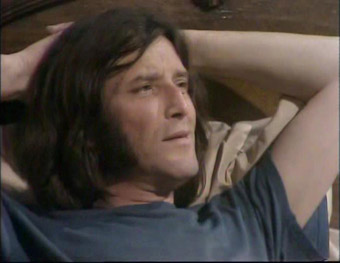
In folk singer Danny Blake (Tom Bell) Behan has the perfect, accessible and perhaps most importantly acceptable cipher through which to direct his plea for tolerance between all citizens of the United Kingdom, nay the world. At first glance, the figure of Danny seems a rather an unlikely messenger for peace, since he looks like the long lost brother of Shameless' Frank Gallagher crossed with Bob Dylan and an added dash of Gram Parsons for good measure, but that's why this drama works so well.
Holed up in a Belfast, hotel with his manager Eddie (Bernard Spear), assistant-turned-girlfriend Miss Arrowroot (Celia Bannerman) and guitarist Steve (Steve Benbow) while a 'no go' drill remains in effect, with all manner of other people, ranging from loud-mouthed American tourists to a learned psychologist and a patriotic workman. With bombs going off the city around them (the first blast is a particular shock), Danny pens songs with the help of Miss Arrowroot for the other guests, procured by the hotel manager (Allan M'Clelland) to put on a show for them, in the absence of the other booked artists, who've been arrested by Police on route.
More than any other play in this set, it has to be viewed and interpreted in the context of the 1970s to be fully appreciated for the powerful and contentious piece of drama it is. Behan's script and the performances of the diverse and talented cast somehow manage to make The Folk Singer and his very particular views a thoughtful and engaging piece of drama, which balances the seriousness of its serious subject matter with a dose of intelligent humour.
A Bit of a Lift [1972] (52:37)
The opening of this play reveals another title card change for the series, but it also highlights some interesting changes for the construction of the play itself. This is much closer in feel to modern-day single dramas than the live two act dramas Armchair Theatre began broadcasting in the 1950s. Gone are the intertitles that tell us of the division between one act and another, in favour of 'parts' akin to the rest of ITV's output. This is a small thing, mere semantics perhaps, but there's a definite shift here away from the theatrical form toward the televisual, a telling reflection of the times. This could be perceived as indicative of the beginnings of wider 'dumbing down' debates that dog contemporary television, but for the more optimistically inclined, it's simply a reflection of the fact that by it's very nature, the drama genre and television drama in particular are evolutionary, tied to the ever-changing boundaries of cultural and social taste.
Written by and starring Donald Churchill, this is a surprisingly humorous look at the power of fate, and how the seemingly accidental crossing of paths can change our lives irrevocably. For henpecked husband Frank (Churchill), that life can't get much worse. Contemplating suicide, he records a final message for wife Barbara in a street booth, sending it off in the post. He journeys to the London hotel where the two held their wedding reception, coming across a wedding party. Amongst them are solicitor Alec (Ronald Fraser) and lonely divorcee Penelope (Ann Beach). Through a series of mistakes and misunderstandings, Alec and Frank become acquainted, changing the course of his plans.

Part comedy of errors, part social critique, Lift is something of a surprise and a good one at that. I always like to be surprised by something, and the opening moments of the play had me rather concerned, but I was most certainly proved wrong. The success of the piece stems from the fact it utilises that oh so typically British brand of self-deprecating wit. Even at his lowest ebb, Frank can find something to laugh at, even if it's himself. It's a testament to the strength of Churchill's writing and performance that Frank ultimately becomes more to us than the mild-mannered gentleman we meet in the opening moments. Elsewhere Fraser and Beach work wonderfully together, acting out a rather screwball-esque, rather cheeky spin on the classic British ode to repressed love, Brief Encounter.
Red Riding Hood [1973] (52:11)
John Peacock's nightmarish, and at times more than a little disturbing take on the classic fable Little Red Riding Hood brings the curtain down in this last disc, and it certainly goes out with a bang. Exploiting the inherent elements of fear within these traditional stories to give it darkest of dark hearts, Powell transposes the story to modern Britain, posing more questions than it answers in regard to the ramifications of testing moral boundaries combined with the pressures of doing and being good. It makes for an explosive mix.
Shy, retiring librarian Grace (a quite frankly incredible Rita Tushingham) is the nicest woman you could hope to meet. Caring for both her grandmother (Hilda Barry) and father (Arthur Hewlett), she has little time to herself. Stuck in her job, kept down by a mean-spirited boss, troubled by her family debts, she's left to daydream about what her life could be like. Most of the time, those dreams include the handsome, charismatic bookseller Harry (an equally powerful Keith Barron), who provides book lending to the elderly. Finally reaching the end of her tether in more ways than one, Grace makes her usual visit to her grandmother, only to find Harry has stopped off with books in hand. After that, things are far from usual.
If pressed, and you only had to pick one example to embody all that Amrchair Theatre is, I'd argue that there's no finer example than Red Riding Hood. Where this play excels is in the quality of the performances and in the writing: the cornerstone of this anthology as a whole. So often these exercises in adaptation can just make the result on screen feel like a rather poor relation and only foster nostalgic memories of how much you enjoyed the original story. However, on rare occasions there are exceptions, and Powell's work is one of them. As a child, I'd never really bought into the idea that the innocent little Red was so easily duped by that sly old fox, but when that sly old fox looks like he could have stepped off the set of a Bond film or could be the true identity of the mysterious Milk Tray Man, you could be forgiven for being lulled into a false sense of security.
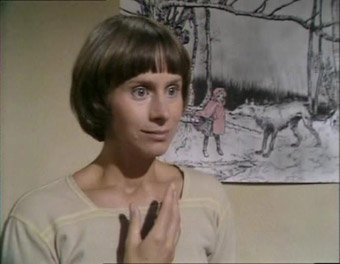
Powell's masterstroke though, is to plant the seed that some of Grace's fantasies may indeed be indications of her finally breaking down under all the pressure she's endured for so long. Tushingham's blood-curdling scream in the final moments signal that we've not only witnessed her descent into darkness, but her unravelling of her mind too.
Armchair Theatre was recorded and stored on broadcast video tape – I'm guessing Quad – in the early 1970s a a noticeably lower resolution of even the standard definition broadcasts of today. There's thus a softness to the image that's accentuated by HD upscaling. There are also odd traces of minor tape damage accrued over time - horizontal blips, the odd burst of coloured noise. But the are all par for the course on transfers from 1970s video-shot television drama, and within these limitations the transfer is solid enough, with nicely balanced contrast and reasonable if slightly muted colour. As was the way at the time, exterior footage is shot on 16mm and the switch to and from film is visible. As the series progresses the defects gradually disappear and even the sharpness improves just a tad. The small box of moving diagonal lines in the top right corner to signify upcoming ad breaks should prompt a twinge of nostalgia in those old enough to remember them.
The Dolby 2.0 mono track is in better shape than you might expect, with the dialogue and sound effects clear and boasting a rather good dynamic range, both of which serve the programmes well.
Though there are none to speak of, don't let that put you off making a purchase, since you won't come away from this feeling short-changed. The work, as they say, speaks for itself.
Consistently high in quality, this release provides just a taster of why Armchair Theatre became synonymous with, and set the benchmark for, television drama. The mere fact these exemplary dramas exist on DVD at all is reason enough to add it to your collection. Whether you're revisiting them from the perspective of nostalgia or coming to them fresh as a fan of quality drama, then you're in for a treat. This was a pleasure to watch and I was left hankering for more. To that end, I do hope that Network release more volumes in the future. Highly recommended.
|